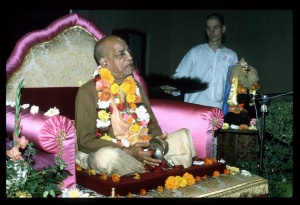CC Antya 8.21: Difference between revisions
No edit summary |
(Vanibot #0054 edit - transform synonyms into clickable links, which search similar occurrences) |
||
| Line 17: | Line 17: | ||
<div class="synonyms"> | <div class="synonyms"> | ||
''tumi'' | ''[//vanipedia.org/wiki/Special:VaniSearch?s=tumi&tab=syno_o&ds=1 tumi]'' — you; ''[//vanipedia.org/wiki/Special:VaniSearch?s=pūrṇa&tab=syno_o&ds=1 pūrṇa]-[//vanipedia.org/wiki/Special:VaniSearch?s=brahma&tab=syno_o&ds=1 brahma]-[//vanipedia.org/wiki/Special:VaniSearch?s=ānanda&tab=syno_o&ds=1 ānanda]'' — full in transcendental bliss; ''[//vanipedia.org/wiki/Special:VaniSearch?s=karaha&tab=syno_o&ds=1 karaha] [//vanipedia.org/wiki/Special:VaniSearch?s=smaraṇa&tab=syno_o&ds=1 smaraṇa]'' — you should remember; ''[//vanipedia.org/wiki/Special:VaniSearch?s=brahma&tab=syno_o&ds=1 brahma]-[//vanipedia.org/wiki/Special:VaniSearch?s=vit&tab=syno_o&ds=1 vit] [//vanipedia.org/wiki/Special:VaniSearch?s=hañā&tab=syno_o&ds=1 hañā]'' — being fully aware of Brahman; ''[//vanipedia.org/wiki/Special:VaniSearch?s=kene&tab=syno_o&ds=1 kene]'' — why; ''[//vanipedia.org/wiki/Special:VaniSearch?s=karaha&tab=syno_o&ds=1 karaha] [//vanipedia.org/wiki/Special:VaniSearch?s=rodana&tab=syno_o&ds=1 rodana]'' — are you crying. | ||
</div> | </div> | ||
Latest revision as of 21:00, 19 February 2024

A.C. Bhaktivedanta Swami Prabhupada
TEXT 21
- "tumi—pūrṇa-brahmānanda, karaha smaraṇa
- brahmavit hañā kene karaha rodana?"
SYNONYMS
tumi — you; pūrṇa-brahma-ānanda — full in transcendental bliss; karaha smaraṇa — you should remember; brahma-vit hañā — being fully aware of Brahman; kene — why; karaha rodana — are you crying.
TRANSLATION
"If you are in full transcendental bliss," he said, "you should now remember only Brahman. Why are you crying?"
PURPORT
As stated in the Bhagavad-gītā, brahma-bhūtaḥ prasannātmā: (BG 18.54) a Brahman realized person is always happy. Na śocati na kāṅkṣati: he neither laments nor aspires for anything. Not knowing why Mādhavendra Purī was crying, Rāmacandra Purī tried to become his advisor. Thus he committed a great offense, for a disciple should never try to instruct his spiritual master.